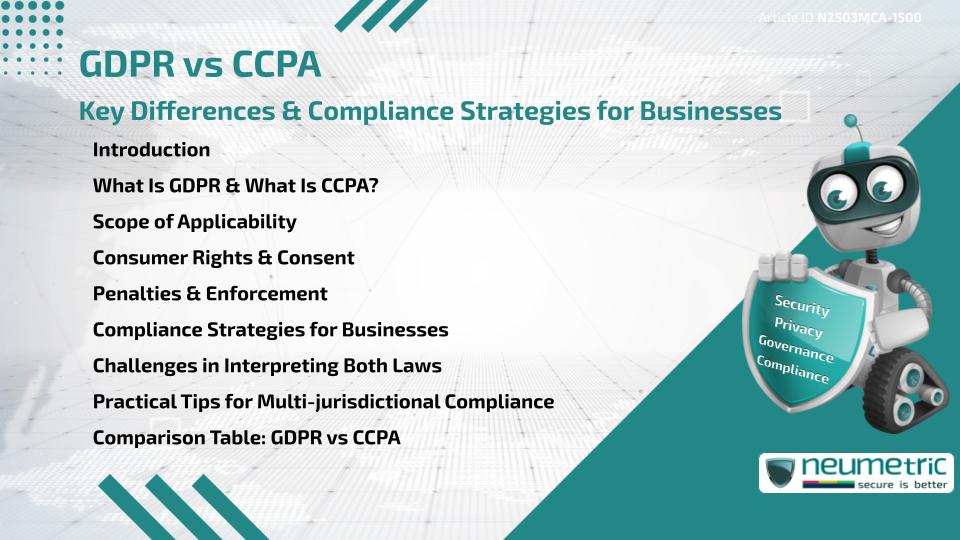Table of Contents
ToggleIntroduction
Privacy Laws are reshaping How Businesses collect & use Personal Data. Two of the most important Regulations are the General Data Protection Regulation [GDPR] & the California Consumer Privacy Act [CCPA]. While both aim to protect Personal Data, they differ in Scope, Rights & Enforcement. This Article breaks down the key differences & offers simple Compliance strategies. If you’re comparing GDPR vs CCPA, here’s what you need to know.
What Is GDPR & What Is CCPA?
The GDPR is a Regulation passed by the European Union in 2016, applying to all Businesses that process Data of individuals in the EU, regardless of where the Business is based.
The CCPA was enacted in California in 2018 & applies to for-profit Businesses that collect Data of California residents & meet certain thresholds.
Think of GDPR vs CCPA like comparing a Global Passport check with a local Driver’s License check—both Verify & Identity but serve different Audiences.
Scope of Applicability
GDPR applies to any Organisation processing Personal Data of People in the EU, whether the Business is in Europe or not. This includes Data Controllers & Data Processors.
CCPA applies only to Businesses that either earn over $25 Million Annually, Buy or Sell Personal Data of 50,000 (or more) Consumers or derive over half of Revenue from selling Personal Data.
So in a GDPR vs CCPA scenario, GDPR is broader in Geographic Scope while CCPA targets specific Business Models.
Consumer Rights & Consent
Under GDPR, Consumers have the Right to Access, Correct, Delete or Restrict the use of their Data. Consent must be Clear & Affirmative.
With CCPA, Consumers can Request Access, Deletion & Opt-out of Data sales. Consent is not always required, especially for Data sharing.
If we compare GDPR vs CCPA, GDPR leans more on proactive Permission, while CCPA allows Businesses to act until a user Opts out.
Penalties & Enforcement
Violations of GDPR can result in Fines of up to 4% of Global turnover or €20 Million, whichever is higher.
CCPA Penalties are smaller—up to $7,500 per intentional violation & $2,500 for unintentional ones. Consumers can also sue Businesses for certain Breaches.
Looking at GDPR vs CCPA, GDPR clearly has heavier Financial consequences, encouraging more rigid Compliance.
Compliance Strategies for Businesses
Businesses should map Data flows, update Privacy Policies & Train Staff. For GDPR, maintaining Records of processing & appointing a Data Protection Officer [DPO] may be needed.
For CCPA, Businesses must provide clear notices & offer Opt-out mechanisms for Data sales.
When comparing GDPR vs CCPA, it’s vital to align your Data practices with the stricter rule—usually GDPR—and build CCPA Compliance on top of that.
Challenges in Interpreting Both Laws
Both laws contain vague terms like “Reasonable Security” or “Selling Data” which create interpretation issues. Companies may struggle when the two laws seem to conflict.
In the GDPR vs CCPA context, it’s not always clear which Regulation takes priority when operating globally, & this can confuse Legal Teams.
Practical Tips for Multi-jurisdictional Compliance
- Use a single Global Privacy Policy with Region-specific sections
- Implement Geo-location to tailor Data collection practices
- Track Consent & User rights through Automated Tools
- Partner with Legal Advisors who understand both Frameworks
These tips can help reduce duplication & improve efficiency when managing GDPR vs CCPA Obligations.
Comparison Table: GDPR vs CCPA
| Feature | GDPR | CCPA |
| Region | European Union | California, USA |
| Applies to | Any Business with EU Data | For-profit California businesses |
| Consent Required? | Yes | Mostly Opt-out |
| Rights Provided | Access, Correction, Erasure | Access, Deletion, Opt-out |
| Max Penalty | €20 million or 4% of Turnover | $7,500 per Violation |
Takeaways
- GDPR vs CCPA comparisons show both similarities & major differences.
- GDPR is stricter, more Global & Enforces stronger Consent.
- CCPA is more Business-focused & less rigid on Opt-in requirements.
- Businesses handling Global Data should prioritise GDPR Compliance while addressing CCPA-specific needs.
FAQ
What does GDPR vs CCPA mean for small Businesses?
Small Businesses must comply if they meet certain thresholds. GDPR applies based on Data Subject location, while CCPA depends on Business Size & Revenue.
How do GDPR vs CCPA define Personal Data?
GDPR includes any Identifiable Data, while CCPA also includes Household & Device-level Data, which makes it slightly broader in Context.
Are GDPR vs CCPA applicable to Non-digital Businesses?
Yes, both Laws apply to any Data Processing—Online or Offline—if the criteria are met, though Digital Businesses face Higher Risks.
Can one Privacy Policy cover GDPR vs CCPA?
Yes, with careful drafting. The Policy should have sections to address both GDPR & CCPA requirements clearly for different Users.
Do GDPR vs CCPA allow Consumer Lawsuits?
CCPA allows limited Lawsuits for Data Breaches. GDPR Violations are handled by Regulators, though Consumers may file Complaints.
How often should GDPR vs CCPA Compliance be Reviewed?
At least Annually or Whenever there are major Legal changes or Internal shifts in Data handling practices.
What Tools help in GDPR vs CCPA Compliance?
Privacy Management Platforms, Data Mapping Tools & Consent Tracking Software are commonly used to meet both Regulations.
Is CCPA only about Selling Data?
No, it covers collection & use of Personal Data too, but the right to Opt-out of Sales is a Key Feature.
How do GDPR vs CCPA handle Consent?
GDPR requires Opt-in Consent, especially for Sensitive Data. CCPA generally relies on Opt-out mechanisms for Data Sharing.
Need help?
Neumetric provides organisations the necessary help to achieve their Cybersecurity, Compliance, Governance, Privacy, Certifications & Pentesting goals.
Organisations & Businesses, specifically those which provide SaaS & AI Solutions, usually need a Cybersecurity Partner for meeting & maintaining the ongoing Security & Privacy needs & requirements of their Clients & Customers.
SOC 2, ISO 27001, NIST, HIPAA, HECVAT, EU GDPR are some of the Frameworks that are served by Fusion – a centralised, automated, AI-enabled SaaS Solution provided by Neumetric.
Reach out to us!


